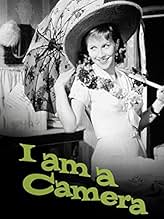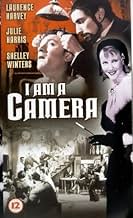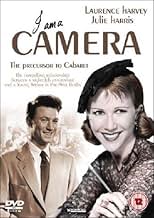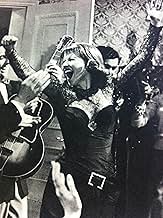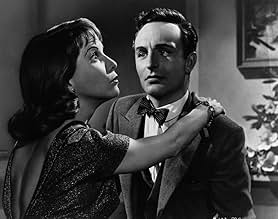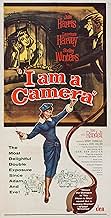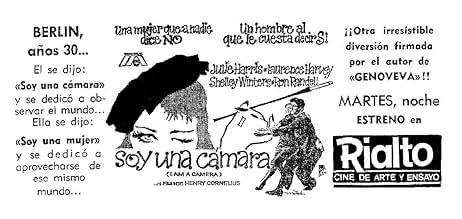IMDb RATING
6.3/10
703
YOUR RATING
In Weimar-era Berlin, an aspiring writer strikes up a friendship with a vivacious, penniless singer.In Weimar-era Berlin, an aspiring writer strikes up a friendship with a vivacious, penniless singer.In Weimar-era Berlin, an aspiring writer strikes up a friendship with a vivacious, penniless singer.
- Director
- Writers
- Stars
- Nominated for 1 BAFTA Award
- 1 nomination total
William Adams
- Old Doctor
- (uncredited)
Ian Ainsley
- Minor Role
- (uncredited)
Charles Andre
- Waiter
- (uncredited)
Julia Arnall
- Model
- (uncredited)
Jack Arrow
- Troika Doorman
- (uncredited)
- Director
- Writers
- All cast & crew
- Production, box office & more at IMDbPro
Featured reviews
In this film Julie Harris reprises her Tony award-winning performance as Sally Bowles bumming in 1920s Berlin. I loved Julie and envied Sally and her carefree ways, but I was young then. While the film may not be "important," it does tell us something about life and culture based upon Christopher Isherwood's evocation of fun-loving pre-Hitler Berlin. It's about a world and time long vanished & highly lamented by aging romantics such as I. So temper your critical faculties and just enjoy a stunning performance by Julie Harris who has won more Tony Awards (5) than any other actress.
This British film version of the stage play I AM A CAMERA is based on Christopher Isherwood's "Berlin Stories." This is the source material for the famous musical CABARET.
Julie Harris, a major stage actress of her day, reprises her 1951 Tony Award winning role as Sally Bowles. She's a far cry from the Liza Minnelli character but the basic "Sally" is all here despite the various film codes that would have blocked this story from being filmed in Hollywood. Harris is perhaps stagy but she's also quite good as the madcap and maddening Sally. Her singing number is obviously dubbed (by Marlene Dietrich no less) although Harris apparently sings for herself in other moments.
Laurence Harvey (with the very ugly hair) plays Isherwood with zero charm and can't even make the character interesting. Shelley Winters does little with the role of Natalia (Marian Winters won a supporting Tony for the play), and Anton Diffring is OK as Fritz. Ron Randell plays the caddish Clive but seems a tad loud. Lee Seidl is funny as the landlady.
Yet despite the overall staginess and cheap look, Harris takes center stage and she is amazing. This film was released the same year as EAST OF EDEN in which Harris gives a glowing performance as Abra. Comparing the two performances gives a good look at the talent Miss Harris possesses. These two characters couldn't be more unalike. Harris' Sally preens and prances about and growls out a very lascivious laugh. She also acts circles around the boring Harvey.
Without the music and with a familiar storyline, many viewers may find little here to recommend this film, but it's a great chance to see the great Julie Harris repeating what was probably a very shocking role in 1951.
Julie Harris, a major stage actress of her day, reprises her 1951 Tony Award winning role as Sally Bowles. She's a far cry from the Liza Minnelli character but the basic "Sally" is all here despite the various film codes that would have blocked this story from being filmed in Hollywood. Harris is perhaps stagy but she's also quite good as the madcap and maddening Sally. Her singing number is obviously dubbed (by Marlene Dietrich no less) although Harris apparently sings for herself in other moments.
Laurence Harvey (with the very ugly hair) plays Isherwood with zero charm and can't even make the character interesting. Shelley Winters does little with the role of Natalia (Marian Winters won a supporting Tony for the play), and Anton Diffring is OK as Fritz. Ron Randell plays the caddish Clive but seems a tad loud. Lee Seidl is funny as the landlady.
Yet despite the overall staginess and cheap look, Harris takes center stage and she is amazing. This film was released the same year as EAST OF EDEN in which Harris gives a glowing performance as Abra. Comparing the two performances gives a good look at the talent Miss Harris possesses. These two characters couldn't be more unalike. Harris' Sally preens and prances about and growls out a very lascivious laugh. She also acts circles around the boring Harvey.
Without the music and with a familiar storyline, many viewers may find little here to recommend this film, but it's a great chance to see the great Julie Harris repeating what was probably a very shocking role in 1951.
In Isherwood's preface to his "Berlin Stories" he talks about meeting Julie Harris backstage during "Camera's" Broadway run, and seeing her as the quintessential Sally Bowles. Maybe he was being gracious, but we couldn't have agreed more. Filled with witty dialogue, this film moved at a brisk pace, and yet when it was over, we felt as if we had seen an in depth slice of the demimonde life in pre-war Berlin. Harris was simply fascinating - what a beautiful smile! Highly recommended (if you can find it) for those who find this time and place irresistible.
Nice details too, including quick shots of Berlin "boot-girls" (dominatrix ladies of the night) and the El Dorado, one of the city's most colorful transvestite bars (even the murals inside are spot on!)
Nice details too, including quick shots of Berlin "boot-girls" (dominatrix ladies of the night) and the El Dorado, one of the city's most colorful transvestite bars (even the murals inside are spot on!)
With two shining stars such as Julie Harris (the Julie Andrews of the 50s), and Lawrence Harvey, this film was almost guaranteed to be a success. The film is not as graphic as the later, superior production, but it is fun to watch, nevertheless. Even Shelley Winters gives a decent performance for a change (oh no, my harshest critic will be offended!). The Harvey character was supposed to be gay, which the latter production made clear, but during this film period, that issue was pretty much taboo in movies. The film has a Capraesque feel to it, and yet it has a few serious moments as well. I am restricted in my use of the word recommended by my critic, but I am going to use it anyway.
This film was inexplicably made in England, and though there is some staginess - noticably in the yelling of some of the actors - director Henry Cornelius provides some clever imagery eg the decadence of the Berlin nightclub by a piglet and two smashing beerglasses, and Christopher standing at a window in the past bringing out us out of the narrative flashback. It also features a remarkable hotel party setpiece.
The infamous role of Sally Bowles is written as a pretentious innocent, and the knowledge that Isherwood was gay feeds into the notion of Sally as a coded drag queen, or at least, an effeminate gay man. The screenplay is full of gay subtext eg Christopher's narcissism demonstrated in his lotions and weights and boufant hairstyle, Sally's descriptions of male musculature, the repeated use of sausages, Sally telling Christopher he doesn't "understand" women, his describing her sex appeal as "inadequate", the rectal thermometer, his massage, his confession that he is "not the marrying type", and fear of being "embroiled" with her. The major difference between this treatment and that of Bob Fosse's Cabaret is the Clive Mortimer character, who here is heterosexual, but would be later turned into the bisexual Max.
Julie Harris performed the role of Sally Bowles on Broadway, and one's opinion of her performance cannot help but be influenced by Liza Minnelli (as is one's opinion of the film as a piece). Harris works against her basic miscasting (she doesn't even use an English accent when we are told Sally is English) because Sally is such an artificial creation. She is like an Actors Studio version of a junior Auntie Mame, and even when her antics become tiresome, she is still far more likeable than Laurence Harvey's starched and basically asexual Christopher. Harris may not have Minnelli's street urchin vulnerability, but she has some inspired moments - posing in front of a mirror wearing a mink coat, her drunken giggling, looking behind a silk scarf, or licking milk with a wild tongue.
The infamous role of Sally Bowles is written as a pretentious innocent, and the knowledge that Isherwood was gay feeds into the notion of Sally as a coded drag queen, or at least, an effeminate gay man. The screenplay is full of gay subtext eg Christopher's narcissism demonstrated in his lotions and weights and boufant hairstyle, Sally's descriptions of male musculature, the repeated use of sausages, Sally telling Christopher he doesn't "understand" women, his describing her sex appeal as "inadequate", the rectal thermometer, his massage, his confession that he is "not the marrying type", and fear of being "embroiled" with her. The major difference between this treatment and that of Bob Fosse's Cabaret is the Clive Mortimer character, who here is heterosexual, but would be later turned into the bisexual Max.
Julie Harris performed the role of Sally Bowles on Broadway, and one's opinion of her performance cannot help but be influenced by Liza Minnelli (as is one's opinion of the film as a piece). Harris works against her basic miscasting (she doesn't even use an English accent when we are told Sally is English) because Sally is such an artificial creation. She is like an Actors Studio version of a junior Auntie Mame, and even when her antics become tiresome, she is still far more likeable than Laurence Harvey's starched and basically asexual Christopher. Harris may not have Minnelli's street urchin vulnerability, but she has some inspired moments - posing in front of a mirror wearing a mink coat, her drunken giggling, looking behind a silk scarf, or licking milk with a wild tongue.
Did you know
- TriviaDespite being far less salacious than the 1951 stage play on which it was based, this film adaptation received a "Condemned" rating from the Legion of Decency, a Roman Catholic organization that passed moral judgments on films between 1933 and 1965. This rating was also given to Psychose (1960), Certains l'aiment chaud (1959) and À bout de souffle (1960).
- GoofsWhilst most of the film is a flashback set in the early 1930s, all the costumes and hairstyles worn are straight out of the early 1950s.
- Quotes
Christopher Isherwood: [to Sally] Any mess you get into, you try and get out of by using your extremely inadequate sex appeal.
- Crazy creditsIn opening credits, Shelley Winters is misspelled "Shelly".
- ConnectionsFeatured in Omnibus: Christopher Isherwood: A Born Foreigner (1969)
- SoundtracksI Saw Him in a Café in Berlin
(uncredited)
Music by Ralph Maria Siegel
English lyrics by Paul Dehn
Sung by Liselotte Malkowsky
[Sally (Julie Harris) sings the song in her club act]
- How long is I Am a Camera?Powered by Alexa
Details
- Runtime
- 1h 38m(98 min)
- Color
- Aspect ratio
- 1.37 : 1
Contribute to this page
Suggest an edit or add missing content


